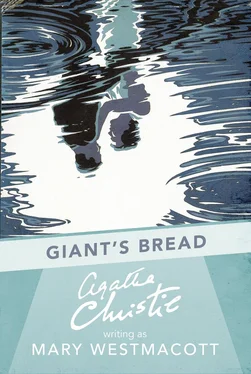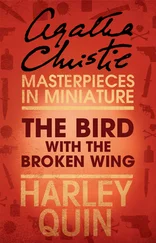‘There, Ma’am, there, Ma’am, don’t take on so. You’d better get back to bed. Edith shall bring you a nice cup of hot tea.’
Her tone was authoritative—severe.
His mother still sobbed and clasped him closer. Vernon’s whole body began to stiffen in resistance. He could bear it a little while longer—a very little while longer—and he’d do anything Mummy wanted if only she’d let go of him.
‘You must make up to me, Vernon—make up to me for the suffering your father has caused me—Oh, my God, what shall I do?’
Somewhere, in the back of his mind, Vernon was aware of Katie, silent, ecstatic, enjoying the scene.
‘Come along, Ma’am,’ said Nurse. ‘You’ll only upset the child.’
The authority in her voice was so marked this time that Vernon’s mother succumbed to it. Leaning weakly on Nurse’s arm, she allowed herself to be led from the room.
Nurse returned a few minutes later very red in the face.
‘My,’ said Katie, ‘didn’t she take on? Regular hysterics—that’s what they call it! Well, this has been a to do! You don’t think she’ll do a mischief to herself, do you? Those nasty ponds in the garden. The Master is a one—not that he hasn’t a lot to put up with from Her. All them scenes and tantrums—’
‘That’ll do, my girl,’ said Nurse. ‘You can get back to your work, and under-servants discussing a matter of this kind with their betters is a thing that I’ve never known take place in a gentleman’s house. Your mother ought to have trained you better.’
With a toss of her head, Katie withdrew. Nurse moved round the nursery table, shifting cups and plates with unwonted sharpness. Her lips moved, muttering to herself.
‘Putting ideas into the child’s head. I’ve no patience with it …’
A new nursemaid came, a thin white girl with protruding eyes. Her name was Isabel, but she was called Susan as being ‘more suitable’. This puzzled Vernon very much. He asked Nurse for an explanation.
‘There are names that are suitable to the gentry, Master Vernon, and names that are suitable for servants. That’s all there is to it.’
‘Then why is her real name Isabel?’
‘There are people who when they christen their children set themselves up to ape their betters.’
The word ape had a distracting influence on Vernon. Apes were monkeys. Did people christen their children at the zoo?
‘I thought people were christened in church.’
‘So they are, Master Vernon.’
Very puzzling—why was everything so puzzling? Why were things more puzzling than they used to be? Why did one person tell you one thing and another person something quite different?
‘Nurse, how do babies come?’
‘You’ve asked me that before, Master Vernon. The little angels bring them in the night through the window.’
‘That Am-am-am—’
‘Don’t stammer, Master Vernon.’
‘Amenkun lady who came—she said I was found under a gooseberry bush.’
‘That’s the way they do with American babies,’ said Nurse serenely.
Vernon heaved a sigh of relief. Of course! He felt a throb of gratitude to Nurse. She always knew. She made the unsteady swaying universe stand still again. And she never laughed. His mother did. He had heard her say to other ladies, ‘He asks me the quaintest questions. Just listen to this. Aren’t children funny and adorable?’
But Vernon couldn’t see that he was funny or adorable at all. He just wanted to know. You’d got to know . That was part of growing up. When you were grown up you knew everything and had gold sovereigns in your purse.
The world went on widening.
There were, for instance, uncles and aunts.
Uncle Sydney was Mummy’s brother. He was short and stout and had rather a red face. He had a habit of humming tunes and of rattling the money in his trouser pockets. He was fond of making jokes, but Vernon did not always think his jokes very funny.
‘Supposing,’ Uncle Sydney would say, ‘I were to put on your hat? Hey? What should I look like, do you think?’
Curious, the questions grown up people asked! Curious—and also difficult, because if there was one thing that Nurse was always impressing upon Vernon, it was that little boys must never make personal remarks.
‘Come now,’ said Uncle Sydney perseveringly. ‘What should I look like? There—’ he snatched up the linen affair in question and balanced it on top of his head. ‘What do I look like—eh?’
Well, if one must answer, one must. Vernon said politely and a little wearily:
‘I think you look rather silly.’
‘That boy of yours has no sense of humour, Myra,’ said Uncle Sydney to his mother. ‘No sense of humour at all. A pity.’
Aunt Nina, Father’s sister, was quite different.
She smelt nice, like the garden on a summer’s day, and she had a soft voice that Vernon liked. She had other virtues—she didn’t kiss you when you didn’t want to be kissed, and she didn’t insist on making jokes. But she didn’t come very often to Abbots Puissants.
She must be, Vernon thought, very brave, because it was she who first made him realize that one could master The Beast.
The Beast lived in the big drawing-room. It had four legs and a shiny brown body. And it had a long row of what Vernon had thought when he was very small, to be teeth. Great yellow shining teeth. From his earliest memory, Vernon had been fascinated and terrified by The Beast. For if you irritated The Beast, it made strange noises, an angry growling or a shrill angry wail—and somehow those noises hurt you more than anything in the world could, they hurt you right down in your inside. They made you shiver and feel sick, and they made your eyes sting and burn, and yet by some strange enchantment, you couldn’t go away.
When Vernon had stories read to him about dragons, he always thought of them as like The Beast. And some of the best games with Mr Green were where they killed The Beast—Vernon plunging a sword into his brown shining body whilst the hundred children whooped and sang behind.
Now that he was a big boy—he knew better, of course. He knew that The Beast’s name was Grand Piano, and that when you deliberately attacked its teeth that was called ‘playingthepiano!’ and that ladies did it after dinner to gentlemen. But in his inmost heart, he was still afraid and dreamt sometimes of The Beast pursuing him up the nursery stairs—and he would wake up screaming.
In his dreams The Beast lived in the Forest, and was wild and savage, and the noises it made were too terrible to be borne.
Mummy sometimes did ‘playingthepiano’ and that Vernon could just bear with difficulty. The Beast, he felt, would not really be waked up by what she was doing to it. But the day Aunt Nina played was different.
Vernon had been conducting one of his imaginary games in a corner. He and Squirrel and Poodle were having a picnic and eating lobsters and chocolate éclairs.
His Aunt Nina had not even noticed that he was in the room. She had sat down on the music stool and was playing idly.
Fascinated, Vernon crept nearer and nearer. Nina looked at last to see him staring at her, the tears running down his face and great sobs shaking his small body. She stopped.
‘What’s the matter, Vernon?’
‘I hate it,’ sobbed Vernon. ‘I ’ate it. I ’ate it. It hurts me here .’ His hands clasped his stomach.
Myra came into the room at that minute. She laughed.
‘Isn’t it odd? That child simply hates music. So very queer.’
‘Why doesn’t he go away if he hates it?’ said Nina.
‘I can’t,’ sobbed Vernon.
‘Isn’t it ridiculous?’ said Myra.
‘I think it’s rather interesting.’
Читать дальше












